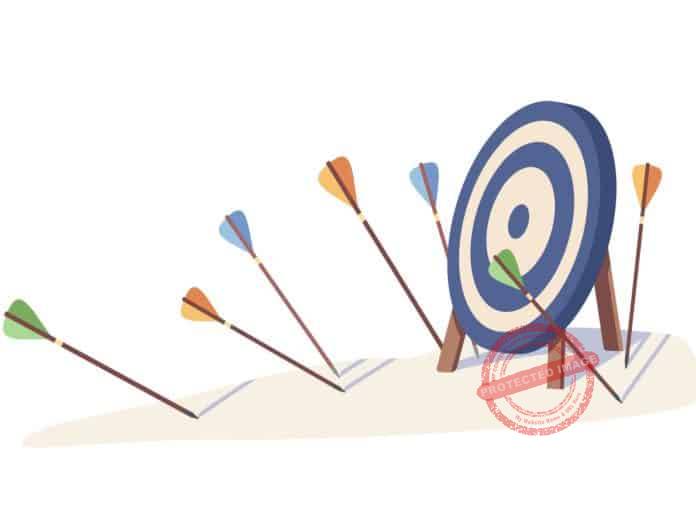Everyone makes mistakes, but not everyone learns from them. But not learning from mistakes can cause a delay in a person’s growth and success.
There are several benefits you stand to gain when you learn from your mistakes and even those of others.
For starters, learning from mistakes gives you leverage over them.
You would learn the things you did not do well the first time and then you can use these lessons to avoid making the same mistake next time.
However, saying you’d learn from mistakes is a lot easier than actually doing so.
Therefore, this article has been written to help you know how to learn from your mistakes and even that of others.
It will also take a closer look at mistakes and their involvement in growth and success.
What Are Mistakes – Learning from Mistakes
Of course, everyone knows what mistakes mean.
When you make a mistake, you most likely may have had a misunderstanding, miscalculated, or made an error in your judgment.
But no one ever sets out to make a mistake.
Mistakes are usually made by accidents and this is what makes them so difficult to deal with.
Because you did not do the things you planned to, you may end up jeopardizing everything you were working towards.
This is why you can always tell when you make a mistake.
However, you may confuse mistake for something else; failure.
Some people tend to see mistakes and failures as the same.
Thankfully, this is not the case.
So, yes, you know what mistakes are; but there’s one thing mistake isn’t.
A mistake is not failure.
Mistakes Vs Failures – Learning from Mistakes
A mistake on one hand is when you unintentionally do things differently from what you should have done.
Mistakes are not necessarily bad things.
Sometimes, something that was done mistakenly can end up being the solution to the problem.
Mistakes can breed innovation and creativity in some cases.
And even in cases where the mistake made is bad for the entire process, you may still be able to rectify them and stay on track.
Whereas, failure on the other hand is when you do not succeed at something.
It means not being able to meet one’s expectations or goals.
When you make a mistake, you may not have to start the process all over.
But when you fail at something, you have to redo the entire process.
So, why do some people consider making a mistake the same thing as failing?
The answer to this is simple.
When you make several mistakes, it may result in failure.
For instance, let’s say you are making a meal.
If you forget to use an ingredient, then that will be a mistake.
But let’s say you forget to add an ingredient, use too much of another ingredient, and cook the meal longer than you were meant to.
All these are consecutive mistakes that may make your cooking effort a failure.
The good thing about both mistakes and failure is that they are natural.
Humans are not perfect beings, so mistakes and failures are bound to happen.
What matters is how you see and react to them.
And based on the experiences of the majority of people, learning from both your mistakes and failures is the best way to react to them.
The Importance of Learning from Mistakes – Learning from Mistakes
You may know that mistakes are inevitable.
But do you know that they are also important?
Everyone is always doing their best to make sure they don’t make mistakes.
While this is good, you also need to see mistakes from a different perspective.
You need to start seeing mistakes as a learning tool.
Instead of being scared of mistakes, you need to understand that they may be necessary or even important in some cases.
Why? Because then, you will be able to move past the mistake and see the lesson behind it
The following are some of the benefits of learning from mistakes.
You’d Avoid Repeating the Same Mistakes
Perhaps, the best benefit of making mistakes is that they often serve as a tool for learning.
When you make mistakes, you can always review them and see the places where you went wrong.
This will make you ready to take on future cases.
You’d know the things you did wrong and know how to avoid them next time.
Innovation
Mistakes sometimes lead to innovation and other breakthroughs.
You can accidentally stumble on a solution because of a mistake you made.
Take the founder of Penicillin Alexander Fleming for instance.
He was able to discover antibiotic properties because he forgot an experiment that he later examined.
This was a mistake but it ended up being a big breakthrough in the medical industry.
Allows You to Reassess Your Goals
When you make a mistake, you need to go back to your planning table.
There you can analyze your mistake and try to understand it.
Doing this will help you achieve two things.
First, you would know how to avoid making the mistake again.
Secondly, you will know how to use the lesson from your mistake to reassess your goals and make sure your next trial is in line with them.
Makes You More Comfortable with Taking Risks – Learning from Mistakes
When you learn from your mistakes, you become more confident in yourself.
You will no longer be afraid of making a mistake because you’d now know what to avoid.
Therefore, you will feel more comfortable with going outside your comfort zone and taking risks.
Read this article to see some important risks every entrepreneur needs to take.
Gives You Courage – Learning from Mistakes
If you see mistakes as a learning tool, you will see the positivity in them rather than the negatives.
One of the positive things that will come out of learning from mistakes is courage.
A basic step of learning from mistakes is owning up to the mistake.
When you do this, you will feel emboldened and the vulnerability that might have accompanied your mistake will fall off.
You feel more confident in yourself and know that you can overcome any setback and challenge thrown at you.
Learning from the Mistakes of Others – Learning from Mistakes
Learning from your mistakes is a smart move.
But learning from the mistakes of others is a wise move.
When you learn from other people’s mistakes, you will be able to avoid making the same mistakes.
You won’t have to go through the mistake to gain valuable lessons from it, and this is just one of the many benefits of learning from other people’s mistakes.
But learning from other people’s mistakes is a lot harder than learning from yours.
This is because a lot of people do not like admitting their mistakes openly.
They may admit their mistakes to themselves but they may have a hard time being open about their mistakes to others.
And you can’t blame them because you most likely are like this too.
When you make a mistake, admitting it openly will be difficult.
But you may not mind admitting it to yourself and learning from it.
This is why the approach you use when trying to learn from others’ mistakes may be slightly different from the approach you use to learn from your mistakes.
How to Learn from the Mistakes of Others – Learning from Mistakes
The first thing you need to know when learning from others’ mistakes is that they are human just like you.
So, you need to always consider their feelings even as you try to analyze their mistakes.
This is especially important if you are analyzing the mistake while they are present.
Make sure that your focus is not on the individual but the mistake.
Do not dig into personal matters that do not concern the problem and make sure you do not make them uncomfortable.
Secondly, always remember that you are analyzing the mistake to learn and not as a judge.
It is not in your place to blame or criticize the person.
You are only doing this to learn valuable lessons and use them to avoid the same and other similar mistakes.
Do not focus on just one factor while analyzing the mistake.
Do not stop your research immediately just because you identified the cause of the mistake.
Rather, make sure you complete your research.
Chances are other factors may have contributed to the mistake.
Picking up one lesson and leaving the rest is almost the same as not doing anything in the first place.
Finally, learn to implement the lessons you have learned in your life too.
Do not be narrow-minded about this.
This means you should not apply the lessons to just one aspect of your life.
Some lessons from others’ mistakes often apply to almost all areas of life and you should not hesitate to use them.
For instance, you may learn a lesson from a person’s sports career and you can use these lessons to avoid similar mistakes as you run your business.
How to Learn from Mistakes – Learning from Mistakes
Yes, learning from mistakes is important and provides so many benefits.
But how do you do this?
How do you make a mistake or see the mistakes of others, and then pick up some lessons from them?
Well, luckily, that is what this section is all about.
Here, some important tips on how you can learn from mistakes (both yours and that of others) will be shared.
1. Own Up to It
A lot of people find it very difficult to admit it to even themselves when they make a mistake.
For some people, it is because they feel owning the mistake makes it more real; whereas others do not admit to their mistakes because of their pride.
If you are one of such persons, then it is time to let go of either your fear or ego and admit it when you make a mistake.
If you can’t admit to your mistakes, there’s no way you can learn from them.
And owning it is the first step toward learning from your mistake.
So, try to calm yourself down and admit your mistake, then apologize for the mistake (if you need to).
Doing this indicates that you are ready to learn from your mistake and also do what it takes to fix it.
2. Analyze the Situation – Learning from Mistakes
Now that you have owned up to your mistake, you have to figure out what was wrong.
You need to be objective with your analysis.
Ask and answer questions that will help you figure out what you did wrong.
Find out what you were doing, when things started going wrong, the reasons for the mistake, and what went wrong.
By asking these questions, you’d be able to identify certain aspects of the problem.
You’d know the exact time you made the mistake, what you were doing, and why the mistake even happened.
Knowing these things will let you know things to avoid next time.
3. Do Not Dwell on Mistakes – Learning from Mistakes
Mistakes are typically seen as a bad experience.
Yes, they are negative, but this does not mean that your reaction toward them should be negative too.
You need to learn how to acknowledge your mistakes and move on from them.
Dwelling on mistakes and beating yourself over them will prevent your learning process.
When you dwell on mistakes, you end up being stuck on them.
And you won’t be able to see beyond the negative aspect of them.
But when you make a mistake and then analyze it, you’d be able to see it positively.
You may even find an advantage hidden within all the negativity.
So, rather than dwelling on the mistakes you make, forgive yourself for them.
Look beyond the negative, analyze the mistake, and use the lesson learned to prevent the mistake from happening again.
4. Get Feedback if Needed– Learning from Mistakes
If you were not the only one involved in the process, then you may need help analyzing the situation.
In this case, you need to ask the other people involved for their opinion.
Ask them questions that can help you figure out when, what, and where things went wrong.
As the boss, your employees may not be as honest as they should with their feedback because of your position.
In cases like this, you need to reassure them that you want their honest opinion.
But if you are asking this from them, you should be ready to take their constructive criticism.
You will be teaching your employees two things if you take this approach.
One, you will be telling them that mistakes are nothing to be ashamed of.
Two, you’d show them that learning from mistakes is very important.
This way, they’d know that while they can make mistakes, they should always be willing to learn from them.
5. Look for the Lessons
At this point, you should have acknowledged your mistake, analyzed it, and also seen it as something you can learn from.
So, the next thing you need to do is figure out the lessons in the mistake.
For instance, let’s say you made the mistake because you did not plan well.
You should have figured this out when analyzing the mistake.
So, you know the reason for the mistake, but what is the lesson for you to learn from it?
Well, in this case, your lesson is to improve your planning skills.
Similarly, if you made a mistake because you did not have enough time to execute the project, then your lesson would be to improve your time management skills.
The lessons are typically what you need to do better next time.
It might be setting better goals or making sure you have deadlines for your next projects.
Finding the lessons is very important because, without them, you won’t learn from your mistakes.
These lessons are what will help you work on yourself, skills, and work so that you can stop making mistakes.
6. Practice What You Learned
Just knowing what you did wrong and learning the lessons from them won’t do.
You need to also implement these lessons and make sure you use them to prevent other mistakes.
But because of how busy you are, you may forget to practice what you have learned.
This is why making a plan on how to implement these lessons is a great idea.
For instance, let’s say you need to improve your time management skills.
If you leave it out of your schedule, you may never get to it.
So, consider adding it to your daily schedule.
Dedicate some minutes of your day to learn more about time management and how you can improve yours.
7. Constantly Evaluate Your Progress – Learning from Mistakes
The main reason for learning from mistakes is to do better.
So, tracking your progress is equally important.
As you implement the lessons you learned and work towards doing better, take out time to evaluate how far you have come.
Your evaluation can be done weekly or monthly depending on what you are working on.
When you evaluate your progress, look out for certain things.
You won’t just stop making mistakes because you made a mistake and you analyzed and learned from it.
No, you may still make mistakes and you may have to reanalyze your mistakes and refine the lessons until you stop making these mistakes.
So, when you evaluate your progress, consider the new mistakes you might have made.
Analyze them, and see how to use the new lessons and the old ones to avoid new mistakes.
One way to evaluate your progress is to keep a journal.
This way, you can easily check out your progress to ensure you get results.
8. Maintain the Mindset of Learning from Mistakes
Finally, for you to keep learning from mistakes, you need to maintain the “mistake is a tool for learning” mindset.
Make sure you see every experience (negative or positive) as a chance to better yourself and your skills.
This way, you won’t dwell on the negative when you make a mistake.
Rather, you’d see a learning opportunity that you need to take advantage of.
Conclusion on Learning from Mistakes
Learning from mistakes is great.
When you learn from mistakes, you will get lessons that will help you avoid making that mistake or similar ones.
Also, you do not necessarily need to make a mistake to learn from it.
You can learn from the mistakes of others.
This is even the smartest move because you get all the lessons without suffering the consequences (if any) of the mistake.
But, when learning from other people’s mistakes, take the right approach.
Make sure you do not blame or criticize the person whose mistake you want to learn from.
Remember that you are only there to learn and not to be a judge.









